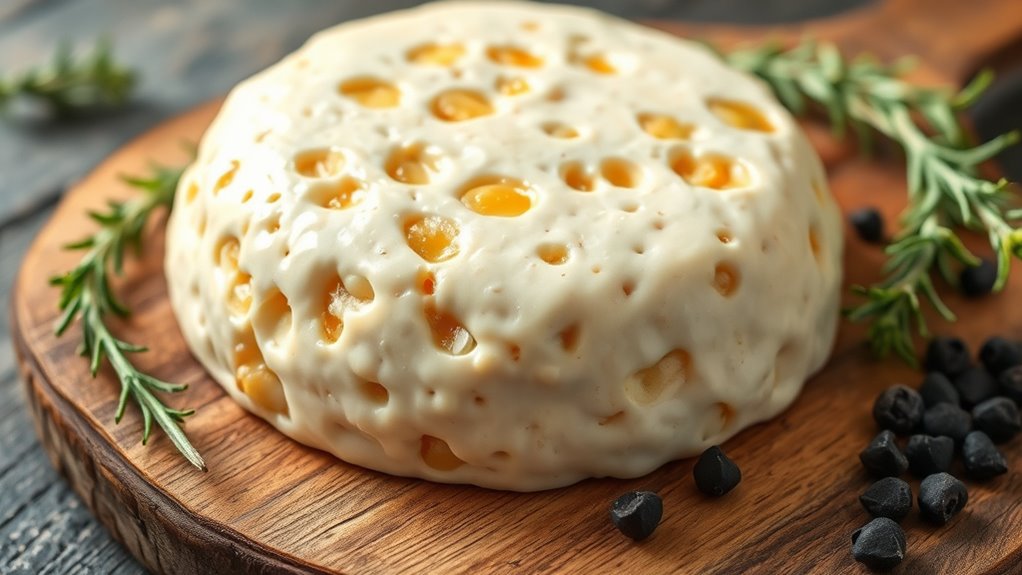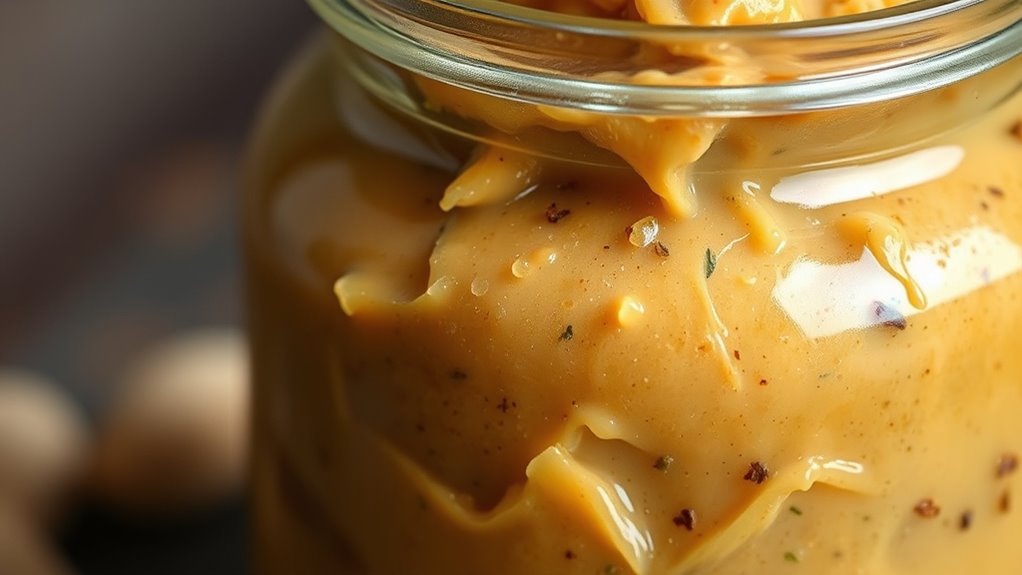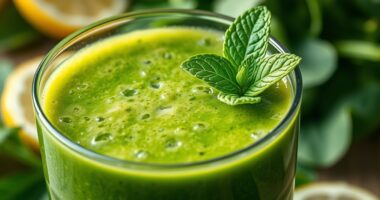To make fermented cashew cheese, soak raw cashews until soft, then blend with water, lemon juice, nutritional yeast, and salt to create a creamy base. Add probiotic cultures and let it ferment at room temperature for 24 to 48 hours, until you see bubbles and a tangy flavor develop. This process transforms simple ingredients into a probiotic-rich, umami-packed cheese that boosts gut health. Keep exploring to discover tips for perfecting your own batch.
Key Takeaways
- Fermented cashew cheese is a probiotic-rich, savory spread with a tangy umami flavor developed through 24–48 hours of fermentation.
- Using probiotic cultures during fermentation boosts gut health by introducing beneficial bacteria.
- Longer fermentation increases both tanginess and probiotic potency, enhancing digestive benefits.
- The process involves soaking, blending, and fermenting cashew mixture at room temperature for optimal probiotic activity.
- This homemade cheese serves as a versatile, gut-healthy addition to meals, adding flavor and nutritional value.

Have you ever wondered how to make a dairy-free cheese that’s both flavorful and probiotic-rich? Fermented cashew cheese is a perfect answer. Not only does it deliver a rich umami taste, but it also offers impressive nutritional benefits. The secret lies in the fermentation process, which transforms simple ingredients into a probiotic powerhouse packed with gut-healthy bacteria. When you ferment cashews, you *release* a new level of flavor and health benefits that store-bought cheese just can’t match.
The process begins with soaking raw cashews, which softens them and makes blending easier. Once soaked, you blend the cashews with water, lemon juice, nutritional yeast, and a pinch of salt to create a creamy base. The magic happens next — you introduce your probiotic starter culture, typically a few strains of live bacteria, to the mixture. This step is *essential* because it kickstarts the fermentation process. During fermentation, the bacteria consume sugars and produce beneficial acids, giving the cheese its tangy flavor and creating a probiotic-rich environment. The fermentation process usually takes about 24 to 48 hours at room temperature, and you’ll notice the mixture bubbling gently, a sign that the bacteria are active and doing their work.
Start by soaking cashews, then blend with water, lemon juice, nutritional yeast, and salt before adding probiotic cultures to ferment into delicious cheese.
As the fermentation progresses, the cheese develops a complex, savory flavor profile with a satisfyingly tangy finish. This not only enhances the taste but also boosts the nutritional benefits of your homemade cheese. Fermentation increases the bioavailability of nutrients in cashews, making minerals like magnesium, zinc, and iron easier for your body to absorb. Plus, the probiotics produced during fermentation support your gut health by balancing your microbiome, which can improve digestion, boost immunity, and even influence mood. Additionally, maintaining proper fermentation conditions ensures the safety and quality of your cheese.
Once fermented, you can use your cashew cheese in countless ways—spread it on crackers, dollop it onto salads, or melt it into sauces. The versatility is endless. Remember, the key to a successful fermented cashew cheese is maintaining a clean workspace and controlling fermentation time and temperature. The longer it ferments, the tangier and more probiotic-rich it becomes. Keep tasting until you find your perfect flavor balance.
In just 48 hours, you transform a handful of simple ingredients into a probiotic-rich, flavorful cheese that’s good for your gut and your taste buds. This process is straightforward, rewarding, and allows you to enjoy a dairy-free alternative that’s full of nutritional benefits. With a little patience, you’ll have a delicious, gut-healthy umami bomb ready to elevate your plant-based dishes.
Frequently Asked Questions
Can Fermented Cashew Cheese Be Made Vegan?
Yes, you can make fermented cashew cheese vegan. You simply use vegan-friendly ingredients and probiotics, avoiding any animal products. This allows you to enjoy vegan alternatives that are both delicious and customizable in flavor. With fermentation, you can tailor the taste to your preferences, creating a gut-healthy, savory cheese that fits your vegan lifestyle. It’s a versatile process that supports flavor customization while keeping everything plant-based.
How Long Does Fermented Cashew Cheese Last in the Fridge?
Ever wonder how long your homemade fermented cashew cheese stays fresh? Generally, you can store it in the fridge for about 7 to 10 days. Keep an eye on spoilage indicators like an off smell, mold, or slimy texture. Proper storage duration and watching for these signs help guarantee your cheese remains safe and delicious. Remember, when in doubt, trust your senses to prevent any unwanted surprises!
Is There a Risk of Mold During Fermentation?
During fermentation, mold risks can arise if conditions aren’t ideal. To guarantee mold prevention and fermentation safety, keep your environment clean, use sterilized utensils, and maintain proper temperatures. Regularly check your cheese for any unusual mold or foul odors. If you spot any mold, discard the batch. Following these steps helps you enjoy your fermented cashew cheese safely and reduces mold risks effectively.
Can I Customize the Flavor of the Cheese?
Like painting a canvas, you can customize the flavor of your fermented cashew cheese with ease. Flavor customization is all about experimenting with ingredient variations—try adding herbs, spices, or different fermenting times to achieve your desired taste. You can adjust acidity, creaminess, or tanginess by tweaking these elements. Don’t be afraid to get creative and make your cheese uniquely yours, tailoring it to your flavor preferences.
Does Fermentation Reduce Cashew Allergenicity?
If you’re concerned about cashew allergies, keep in mind that fermentation may help with allergen reduction, but it doesn’t eliminate the risk completely. Fermentation can break down some proteins that trigger allergies, potentially making the cheese easier to digest for sensitive individuals. However, if you have a severe cashew allergy, it’s safest to avoid fermented cashew cheese altogether, as allergenicity can vary and isn’t fully reduced through fermentation.
Conclusion
As you savor this fermented cashew cheese, remember it’s more than just a flavorful addition—it’s a symbol of transformation. In just 48 hours, humble cashews become a gut-healthy umami bomb, embodying patience and nurturing. Let each bite remind you that true nourishment arises from gentle fermentation, turning simple ingredients into something greater. Embrace this cheese as a tribute to nature’s quiet alchemy, where small acts of care forge profound health and flavor.









